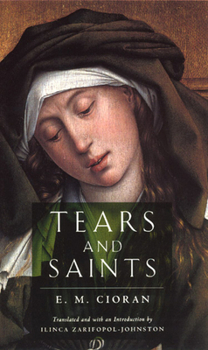Tears and Saints
Select Format
Select Condition 
Book Overview
By the mid-1930s, Emil Cioran was already known as a leader of a new generation of politically committed Romanian intellectuals. Researching another, more radical book, Cioran was spending hours in a library poring over the lives of saints. As a modern hagiographer, Cioran "dreamt" himself "the chronicler of these saints' falls between heaven and earth, the intimate knower of the ardors in their hearts, the historian of God's insomniacs." Inspired...
Format:Paperback
Language:English
ISBN:0226106748
ISBN13:9780226106748
Release Date:July 1998
Publisher:University of Chicago Press
Length:154 Pages
Weight:0.52 lbs.
Dimensions:0.5" x 5.1" x 8.4"
Customer Reviews
3 ratings
a paradise of tears
Published by Thriftbooks.com User , 24 years ago
Whether God exists or not, the saints are facts. In this slim, aphoristic book (his last written in Romanian), Cioran sets out to measure the distance between us and the saints. He finds in them an antipode to ourselves--their sickness, melancholy, insomnia and lust for the absolute all charged positive, where for us they've become SYMPTOMS. For Cioran, the saints' tears are evidence of a special consciousness--a nostalgia for an Absolute, a dissatisfaction with the world as we find it--that we recapture at the irrational extremes of sex, boredom, illness and, above all, the melacholy rapture of music. Cioran doesn't try to psychoanalyze the saints, or dismiss them as aberrations. Instead, he uses them to explore parts of our own psychology (our souls?) that have new meanings here, on the other side of God. What's left to us since the saints have cried? "We no longer believe in them. WE ONLY ADMIRE THEIR ILLUSIONS. Hence our compassion."
First there's the cover, then the title - I had to read it.
Published by Thriftbooks.com User , 24 years ago
Seriously, three things made me pick up this book when I had no notion of who E.M. Cioran was. First, the beautiful cover with a detail from "The Descent from the Cross"; second, the intriguing title; and third the quote from the Chicago Tribune printed on the back: "makes the postwar French Existentialists look like a 6th-grade meeting of the Future Bores of America". I enjoy the French Existentialists - I had to see what was up with Cioran.What is up with Cioran? He is absolutely top-notch: searching for the origin of tears in the lives of female saints known for copious tears ... from them he build a case against theology and institution and for intuition and sentiment ... all the while being highly political (Romanian politics).The book pieces itself together in a series of small clips. An example: "Schopenhaurer maintains that, if we were to invite the dead back to life, they would refuse. I believe, on the contrary, that they would die a second time from too much joy."An enthralling, thought-provoking book to be savored. And you can still enjoy the French existentialists.
Cioran dissects the divide between man and God
Published by Thriftbooks.com User , 25 years ago
E.M. Cioran, brought to us by the incomparable Richard Howard in French is now finding his way into our hearts from his Romanian youth. Ilinca Zarofopol-Johnston's translation is smooth, losing none of the cutting wit that is so exemplary of Cioran. The questions that Cioran asks here are the ones that Nietzsche required thinkers to ask in the preceding century. Cioran aptly describes our world, one in which the Middle Ages exhausted belief, leaving us with only appearances. His task is to find our "salvation" amongst those appearances. To find our way back to the world which we have lost and tried to regain through extratemporal belief, be it the rudimentary Judeo-Christian belief system or the universe of the Kantian transcendental ego. As Susan Sontag wrote of him, he is truly the last in a line of thinkers that includes Kierkegaard and Nietzsche. To ruminate on his tears and to breath the air of his saints in this book is indeed a heady experience. It is a book not to be taken lightly.






